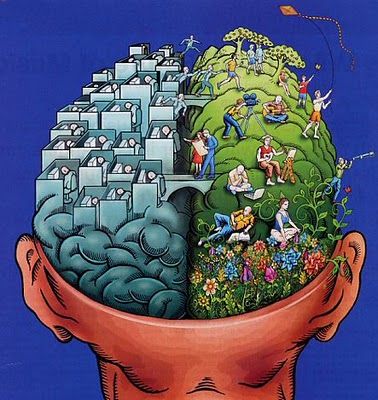
|
A Giddy Tour of MetapoliticsSimon Sheppard ventures beyond ‘left’ and ‘right’
|
Politics is about the acquisition and exercise of power. My interest is male-female interaction which, because it has been going on for so long, is a rich source of power games. A similar analysis can be applied to the strategies of national populations, what in modern parlance is called “culture.” It is an enormous subject and this can only be a whirlwind tour. Nonetheless, the political implications quickly become inescapable.
Understanding behaviour demands an evolutionary perspective. To illustrate we need look no further than our natural desires for companionship and sex. We are talking of the “biological imperative” humorously encapsulated in Farber’s Rule, that “Necessity is the mother of strange bedfellows.”
Strong sexual desire confers advantage for the survival of our genes. David Buss, perhaps the best known evolutionary psychologist, pointed out that every one of our ancestors, over hundreds of thousands of generations, must have succeeded in finding a mate and having children. Were it not for this unbroken ancestry each one of us simply wouldn’t be here.
In the evolutionary game, the payoff is how many grandchildren we end up with. Is this our metric now, our measure of success? For Britons today this measure is invalid: we are already massively over-populated. Martin Baker reported in the Independent, 28 October 2007, that the population of Britain was at least 77 million. Two major food firms derived this figure from the amount of food being consumed. Officially, according to census returns, we were not supposed to reach this number until 2051.
In judging a policy the questions we need to ask are, will it reduce the population, so that future generations will enjoy a higher quality of life? Will it make us healthier, more intelligent, more civilised? Or will the policy be dysgenic? This is how we should measure the policies with which we engage and wish to promote.

True and false labels
When examining sexual politics it is female strategies which demand most attention. This is because in pre-history, in fact until quite recently, the male didn’t have to adopt subtle strategies, he just used brute force. Thus male strategies are much simpler.
While the male-female dichotomy is real and physical, the division between ‘left’ and ‘right’ is less concrete. These labels actually derive from the seating arrangements in the 1789 French National Assembly. The ‘left’ was anti-Establishment while the ‘right’ supported the status quo, particularly the monarchy. In France the monarchy fell, while in Britain it might as well have. Now it is us who are anti-Establishment so really, we who are called ‘right-wing’ are actually ‘left’!
Perhaps the terms ‘left-wing’ and ‘right-wing’ belong with ‘anti-Semitism,’ ‘racism’ and ‘homophobia’ as the vocabulary of the enemy, designed to imprison discourse within the context our adversaries have defined. Many issues transcend this doubtful divide. For instance, in Britain in the early days some of the most outspoken opponents of mass immigration were trade unionists.
We can dismiss almost all of the waffle on TV, in newspapers and on the radio: the real power of the media is being able to assign labels. To give just one example, some of us call ourselves ‘revisionists’ but the media call us ‘Holocaust deniers.’ All the flim-flam merely reinforces the label that has been assigned.
Religion is an integral part of culture, so is very pertinent to our theme. People have sometimes argued that “religion is the cause of war” and some go so far as to say that religion is its sole cause. The glaring counterexample to this argument is Northern Ireland. There, two ostensibly Christian populations were at each others’ throats for decades. Attempts at reconciliation were met with claims like ‘Twenty years ago your lot did such-and-such,’ to be countered with ‘But fifty years ago your lot did so-and-so.’ And this game was played by two sides, each of which claimed adherence to the Christian doctrine of forgiveness!
The situation in Northern Ireland also illustrates one of Darwin’s observations, that the competition is always the most severe between the most closely allied species. This likely accounts for why a Northern Irishman can rail against his counterpart on the other side of the sectarian divide but welcome with open arms more recent Negro and Indian colonists. Incidentally, this factor is also relevant to the factional in-fighting which so often afflicts nationalist organisations.
My idea is that religion is a kind of ‘cultural carrier bag’ containing all sorts of traits and cultural norms. Having religion as a vehicle for these features has certain benefits.

Forgiveness and superstition
To illustrate, we examine that doctrine of forgiveness. Somehow – it matters not one jot how – the idea, or meme, arose and found some consonance in the population. The policy was advantageous: in the language of game theory, it is a form of Generous Tit For Tat, which can prevail against strict Tit For Tat. So the policy was wrapped up (formalised) and placed in that cultural carrier bag. The result is that for centuries an authority figure, typically the village vicar, encouraged the policy, increasing its likelihood and conferring advantage to the population generally.
For contrast we can look at a religious tradition with a different origin, that of the sacred cow. According to Marvin Harris it sprang from Hindu doctrine and served to protect the cow from being slaughtered during times of drought and starvation. The taboo conferred advantage, since without it there would be no more oxen, removing the means of food production and putting the farmer permanently out of business. Eating the farm’s ox was like eating the farm’s tractor; eating the cow was tantamount to destroying the tractor factory.
Religious practices might emerge purely by coincidence. One experiment by the behaviourist B. F. Skinner demonstrated superstition in pigeons. (Behaviourists now use pigeons almost exclusively.) Hungry pigeons were given food pellets at random, unrelated to their behaviour. Shortly the pigeons were found to be performing all manner of peculiar acts. One distinctively bobbed its head, others developed a pendulum motion of the head and body, another was shortly twitching its head while hopping from one leg to another.
What had happened was that whatever the pigeon was doing at the moment the food pellet arrived became associated with it. Once that association had been made it became stuck, and was sometimes even amplified.
We can extend this to humans, and imagine a Red Indian tribe performing a dance which quite by chance was followed by rain. This accounts for the inception of the Rain Dance – the association persisted. Similarly the cow continues to be venerated in India today, even if oxen are no longer essential to plough the land.
The implication is that we should take entirely seriously statements in the Koran and Talmud concerning treatment of rivals. These exhortations are not mere rhetoric, but advantageous traits which have been formalised, just like the Christian doctrine of forgiveness.


Naivety of whites
Andrew Fraser has explored a particular feature of white populations, our naivety – whites tend to be naturally trusting. This also is an advantageous trait. Suppose an isolated village a few hundred years ago wanted a church bell. The elders contracted a firm many miles away who were not only unrelated by any family connection, they were untried as a trading partner. It could be no other way, since the bell is the first and last for generations. The project was completed, just as the vast majority of such endeavours are. Perhaps the modern equivalent of that bell would be the construction of a small power station. With distrust toward non-relatives many ventures of this scale would never be accomplished.
In Arab culture, business is traditionally conducted between members of the extended family, and this probably largely accounts for intermarriage between cousins. Among Negroes, the historical unit of cohesion is the tribe.
Of course whites’ trusting nature has a down-side. It creates a vacuum, and we know that nature abhors those. There is more than an implication that another population exists to exploit it.

Laws of nature
Here may be mentioned an important element of social interaction, largely ignored in mainstream discourse, Hamilton’s rule. This rule specifies that altruistic behaviour occurs when br > c. Then b is benefit, c is cost and r is – wait for it – relatedness. This is the biological basis of favouring kinsfolk. William Hamilton was a very highly regarded British biologist who died in 2000, after falling ill during a field trip to Africa, and this rule is his great legacy. By it was solved a problem which confounded Darwin, of why a bird gives an alarm call for the benefit of its conspecifics at risk (i.e. cost) to itself. Another example is sterile worker ants toiling because they are related to their queen. Would you believe that psychologists still teach altruism with no mention of it?
The cat cares not for the welfare of the mouse, nor does the sparrowhawk trouble itself with the feelings of the sparrow. This is nature’s way – “red in tooth and claw.” We are better than animals, at least most of the time, but that doesn’t mean we can defy the laws by which our very existence arose.
Now, unlike that village vicar of yesteryear, authority figures promote a morality which is harmful to us. If a moral code benefits others at our cost, then it is unnatural, perverted. The only natural measure of a policy is whether it confers advantage – ‘What’s good for us.’ Anything else is abnormal. Revilo P. Oliver called this aberrant morality “perverted collective masochism” and interestingly, listed seven white traits which make us susceptible to it.
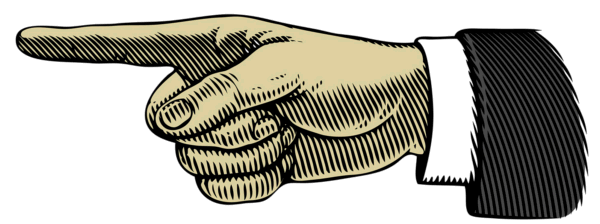
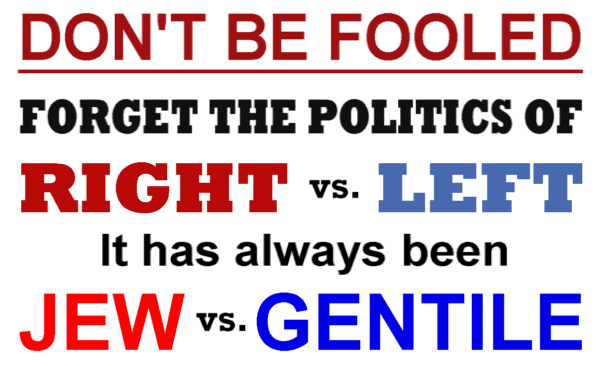
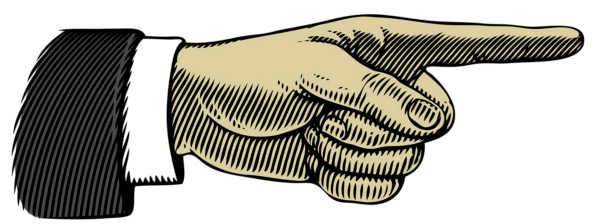
Moulding populations
A profound topic within this metapolitical theme is the methods by which a population may be altered, perhaps to its advantage, perhaps to its detriment and the benefit of another. Individuals with certain traits may be disinherited, depriving them of progeny. A practice in Victorian times was that if one of a family committed a murder, none of that family could marry. If a wife was thought to have poisoned her husband say, the concept of “bad blood” meant that none of her sons and daughters could find a spouse. The idea was plainly to remove the ‘murderous gene’ from the population. Similarly in rural Ireland, if the local priest discovered that there was insanity in either of a couple’s family he would refuse to marry them. The contemporary example of disinheritance I am about to give is telling in several ways.
Women constantly strive to make their environment more feminine. The more feminine the environment, the more comfortable she feels. It may be that culture is largely determined by what males allow their females to get away with. In one culture a particular bid may succeed, in another it fails. So each society can be viewed as a mixture of masculine and feminine practices.
One could undertake an analysis of this kind on the Protestant and Catholic denominations, comparing the masculine and feminine features of each. Hence in Catholicism, confessions are feminine; veneration of the Holy Mother is feminine; prohibition of birth control is feminine; adherence to tradition is masculine.
Here is that telling example: What would happen if only those males willing to push a pram and change nappies were allowed to sire children? Such a situation would have been inconceivable a century ago, but the trend is readily apparent today. It would be the female explicitly selecting males for feminine qualities, by this means again making her environment more feminine. The problem of course is that a feminized population is weak, unstable and readily dominated by a more masculine one.
Our population is actively being moulded by the malevolent influences it daily endures. However there is no secret cabal orchestrating the ‘War on Whites’ from some deep Operations Room, even if it might sometimes seem so. What does certainly exist is instinct, and instincts impel populations to behaviour which is advantageous to them. Those instincts are ancient and effective, having been tested and refined over millennia, and with changes of circumstance they find expression in novel ways. Many which were traditionally inhibited are now being expressed to an unprecedented degree.
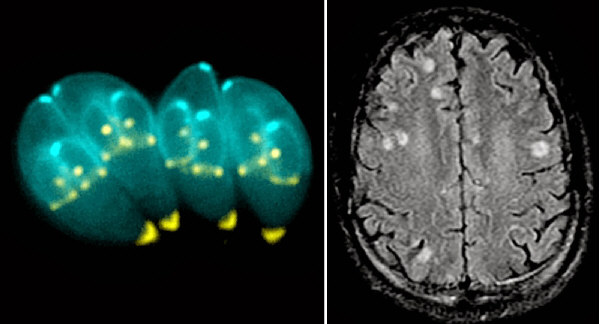
|
| Left: Four T. gondii protozoa. Right: The cysts they produce in the brain. |
A flap about cats
Finally an example shall be given of an issue which must surely be metapolitical: it certainly transcends any political divide. It concerns cats, and borrows on work begun by the Czech biologist Jaroslav Flegr.
Now I have nothing against the odd homely pussy-cat, but the reality is that most urban areas are full of them. Not only do they kill millions of wild birds and animals, they are killing us. Cats carry a parasite which infects humans. A conservative figure is that a third of us are already infected. The infection is incurable.
This is an example of strategies in nature, how nature fills a vacuum, and of how parasites operate. Cysts of Toxoplasma gondii occupy the human brain and alter our behaviour. Flegr found that infected individuals were 2.65 times more likely to be involved in a road accident. This was not an isolated study: many of Flegr’s findings have been repeated in other countries with similar results.
“Toxo” is a protozoa, like malaria, and has evolved to infect rodents, making them less fearful of cats. Thus the rodent is more likely to be caught and eaten, enabling the parasite to perpetuate itself by passing back to the cat. In humans it appears to affect risk-taking. For example, it might influence a decision whether to overtake or not.
The parasite has also been linked with schizophrenia and perhaps this accounts for the stereotype of the batty woman living with twenty cats. Chances are, her brain is riddled with Toxoplasma gondii. Notwithstanding, the origin of the ‘cat problem’ is obvious: it is a symptom of feminization. Even Darwin commented that cats were “so much valued by women and children." They had only become popular as domestic pets a few decades before.
Humans have cats, cats have fleas and probably the fleas have a parasite of their own too. Parasites are fascinating creatures, full of the most subtle tricks. There is a parasite of sheep, which somehow gets an ant to clamp its jaws to the top of a blade of grass and stay there until it is either eaten by a sheep or dies. By this means the parasite passes into the sheep for the next stage of its life-cycle, eventually to emerge from the other end where it again infects ants. The important point is that like the cat parasite, it influences a host for its benefit. Nature is replete with similar examples.
The implication is, do there exist human parasites which manipulate others for their benefit? The answer ‘No’ is plainly ridiculous, considering the ubiquity and subtlety of parasites in nature.
The impact widespread human infection by Toxoplasma gondii could be having on society is dismaying – it’s like something out of Invasion of the Body Snatchers. However, even this is not its most disturbing aspect. Its most outstanding feature is that it is absent from public discourse. Like the matter of the real number of people living in Britain, there are no banner headlines, TV documentaries, nor meetings of official committees concerned with public health.
Then, how would the contemporary politician fare who proposed a tax on cat food, rounding up cats without a licence and bell on their collar, or putting down infected moggies? Mainstream politics is little more than a public bitch-fight, with nary a glance at the real problems we face.
